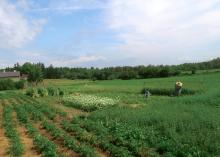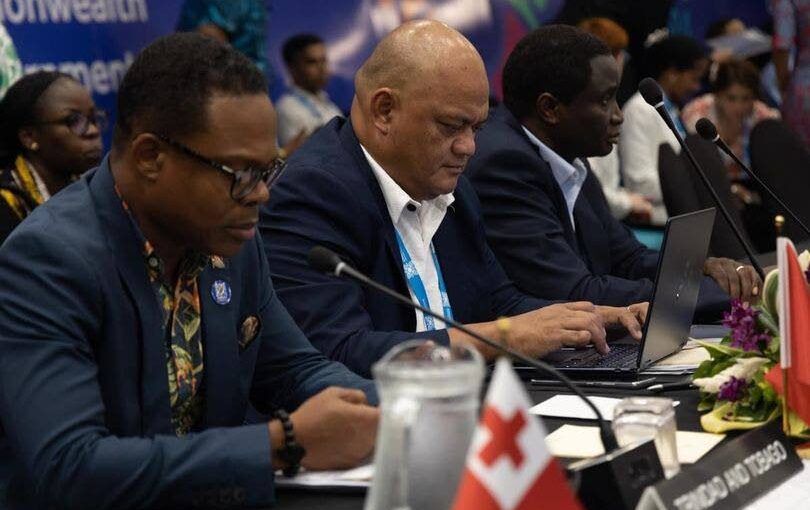The first time I flew overseas, I remember wondering whether I had flown beyond the reach of God. We had, quite literally, risen on the wings of the...
Vous n'êtes pas connecté
- English
- Français
- عربي
- Español
- Deutsch
- Português
- русский язык
- Català
- Italiano
- Nederlands, Vlaams
- Norsk
- فارسی
- বাংলা
- اردو
- Azərbaycan dili
- Bahasa Indonesia
- Հայերեն
- Ελληνικά
- Bosanski jezik
- українська мова
- Íslenska
- Türkmen, Түркмен
- Türkçe
- Shqip
- Eesti keel
- magyar
- Қазақ тілі
- Kalaallisut ; kalaallit oqaasii
- Lietuvių kalba
- Latviešu valoda
- македонски јазик
- Монгол
- Bahasa Melayu ; بهاس ملايو
- ဗမာစာ
- Slovenščina
- тоҷикӣ ; toğikī ; تاجیکی
- ไทย
- O'zbek ; Ўзбек ; أۇزبېك
- Tiếng Việt
- ភាសាខ្មែរ
- རྫོང་ཁ
- Soomaaliga ; af Soomaali
 Maroc - CANADIANMENNONITE.ORG - A La Une - 14/Jun 19:36
Maroc - CANADIANMENNONITE.ORG - A La Une - 14/Jun 19:36
The long road to freedom
As I write this, we are in the midst of planting our garden. But don’t get the wrong image; when I say garden, I mean a field worked by hand to grow our own food. We grow not just vegetables, but also dietary staples that provide our carbohydrates and proteins, as well as some non-food crops. Over the years, we’ve grown and raised an increasing amount of our staples—including spelt, poultry and livestock—but in ways that are heavily reliant on fossil fuels, both for our tractor and for the production of livestock feed we buy. You could call this food local and organic, but it isn’t sustainable. The changes we’ve made are a good start but aren’t enough. We are still very much in process. As we reduce tractor reliance, we’re trying to go from a 0.8-acre garden to a full acre this spring using only human power and spades. That will take about 120 person-hours of digging. Another part of the work is altering our diet—toward more dry legumes, maize and potatoes—measuring what we use, working out yields from last year, projecting crop budgets and planning garden areas and rotation to move toward meeting that budget. It’s a long road because it’s a big project. From personal to systemic This is action on a personal level to address the environmental problems and injustices in the world. Individual action is often criticized as an insufficient response. If, by “individual action,” we mean a few symbolic tweaks to our consumption patterns, it definitely is insufficient, but I want to reframe the conversation from individual versus political action to old systems versus reimagined systems, and to make a case for how personal action helps make that shift to new systems. Our lives are so dependent on fossil fuels that it might be said that everything we have is made from oil. Many of us agree this is not sustainable. Fewer people would accept that this means our personal lives need to change significantly. Instead, we may focus on demanding that governments and corporations limit or ban fossil-fuel-based products. While the use of fossil fuels must end, the things we need still have to come from somewhere. The way of producing the things we need is what I mean by a system, a way of life. It is possible that science will find some other resources to exploit, which will not be sustainable, but which, if we’re privileged enough, will let us continue in the direction we are going for a while longer, though still at someone else’s cost. Holding on to our lifestyle in this way is a refusal to care about what will happen in other times and places; it is basically sticking to the old system. If we risk caring, we realize that what we need is not to tweak the old system but to change systems—to find a new way to live. This new system must be a way by which we all could live. How do we change systems? One system we are all familiar with is our own family system, in which each member has a role. While this system often keeps family members from changing, it is also true that if one member changes, that shifts the system. When there is a problem, and we want our family system to change, often the best strategy is not to try to change someone else, but to change how we work in the system. It is not that we are to blame for the problem, but that because we are part of a problematic pattern, changing ourselves breaks the pattern. Toward healthy systems With respect to the environment and injustice, we are in the system which keeps us from changing, but the system is also made up of us. It is disingenuous to cast ourselves as helpless victims of the system. We can make personal changes. I think the issue is more that, for those of us who are privileged, change in the right direction will cost us something. The system works for us; at the same time, there are many signs the system is sick. Climate change is just one of them. If we want to replace that system with a healthy system, we must accept and expect a personal cost, and perhaps even see it as a sign that we’re headed in the right direction. The great opportunity we have is that we can begin to act now. By beginning to act on a personal level we can be imaginative. If, as Marcus Rempel suggested in a March 29 letter to the editor, we are addicted to fossil fuels, then asking governments and corporations to shut them down is to go the route of Prohibition, and that won’t help if we don’t find sobriety in our own lives. Finding crops which work well to plant, harvest, store and prepare by hand takes a lot of creativity. The government imposing a carbon tax on farm inputs won’t help us to do that creative work. By beginning to act on a personal level we can adapt what we do to our local circumstances. Centralized approaches tend to standardize, to prescribe. The specifics of how we live in Southwestern Ontario will not always suit elsewhere. By beginning to act on a personal level we can change based on choice, not coercion. This is not only more palatable for the changer, but produces the deeper change that is necessary: in our hearts and minds. When we choose to change, we aren’t just toeing someone else’s line but are trying to satisfy ourselves that we are doing what we need to do. That’s why we’re taking on those 120 hours of digging rather than taking various problematic shortcuts. By contrast, political solutions often settle for the lowest common denominator. A political compromise tries to get as many people as possible to commit to doing as little as possible, and that means we won’t go deep enough in re-evaluating how we do things. By beginning to act on a personal level, we can move in the right direction. When we begin to live in new ways we will know what would be helpful for the law to restrict or promote. Our experience indicates we have much more land than we need for our family, but to have more people living on and from this land would mean very different land-use policies than those geared to urban intensification. Our need for each other While our action is personal, it is not individualistic. We are mutually dependent, both physically and socially. Creating a new culture is hard work. We need to do it together. This comes with a change in the understanding of salvation. Salvation is not primarily about saving me from the consequences of my own folly so that I’ll be okay, but about us being redeemed so that, with God’s help, we can stop living in ways that got us into this mess in the first place, so that all things will be okay. Instead of calling on God or government to “fix” climate change with new technology that still exploits the earth and other people, salvation enables us to live into a new system, a new way of life. In this understanding of salvation, our household is a means of grace for me. I find grace through physical enablement— sharing the work—through challenge, through accountability and through support. We are being saved with each other, by means of each other, into God’s will for all. We are grateful for all who join us in this. The Wiederkehr garden. Photo by Andre Wiederkehr Turning sod into garden with human power on the Wiederkehr farm. Photo by Andre Wiederkehr Share this page:
Articles similaires
Celebrating World Teachers’ Day: Honoring the Heroes of Education
By Sunil Taldar During World Teachers’ Day, we come together to celebrate the invaluable contributions of teachers across the globe. This year’s...
Family legacies at the heart of puja stores
BAVINA SOOKDEO THE puja store industry has blossomed into a niche yet essential business sector that caters to a range of religious and cultural...
Readers Write: November 2024
Good people hurt by MCC I am writing this letter in support of the individuals who wrote and signed the open letter to Mennonite Central Committee...
Browne unfazed by push-back on reparations
DR AMERY BROWNE, Minister of Foreign and Caricom Affairs, is undaunted by the negative signals coming from the United Kingdom regarding calls by...
Time for change: Vision for brighter country
THE EDITOR: As TT continues to face numerous challenges under the current administration, I believe it is time for a new vision to lead our nation...
Time for change: Vision for brighter country
THE EDITOR: As TT continues to face numerous challenges under the current administration, I believe it is time for a new vision to lead our nation...
The colour of prayer
For my birthday last month, I asked for markers. Since then, I’ve spent several hours in my soft front-room chair, copying out verses from the...
Poverty Is Rising And Inequality Widening In Asia And The Pacific – OpEd
The Asia-Pacific region, with over 4.8 billion people spread across 58 countries and territories, is home to about 60 percent of the world’s total...
Gov Aiyedatiwa takes campaign train to Akoko South East LG, reiterates commitment to inclusive governance
In continuation of his campaign tour across Ondo State ahead of the November 16 gubernatorial election, Governor Lucky Orimisan Aiyedatiwa on Thursday...
Les derniers communiqués
-
Four Seasons to Expand Saudi Arabian Portfolio Alongside Dar Al Omran Company with New Hotel in Madinah
Four Seasons Hotels and Resorts - 07/05/2024
-
Four Seasons Yachts Unveils Inaugural Itineraries to the Caribbean and Mediterranean and a First Look at its 95 Spectacular Suites
Four Seasons Hotels and Resorts - 27/03/2024
-
Visual 01Elevating Excellence: Four Seasons Embarks on the Next Stage of Strategic Global Growth
Four Seasons Hotels and Resorts - 22/01/2024








